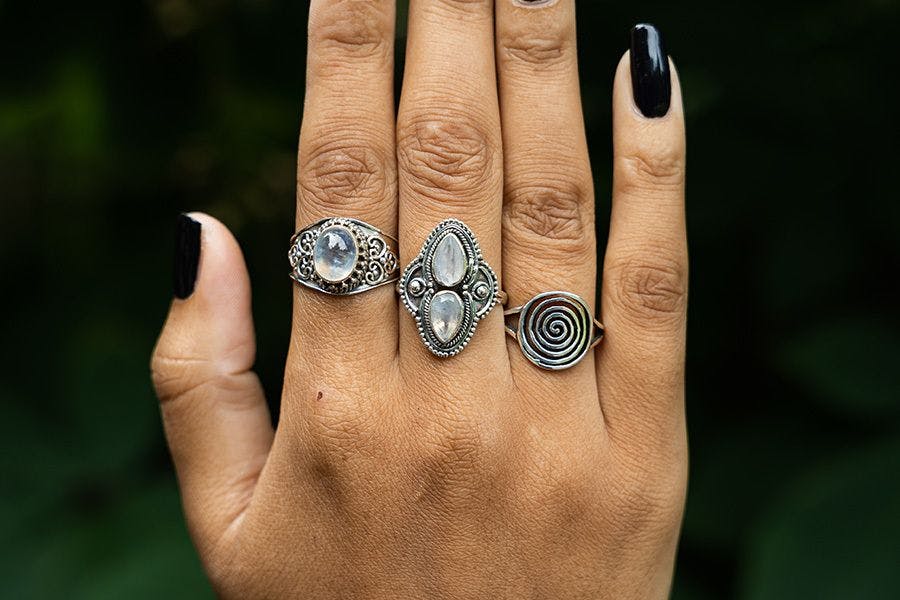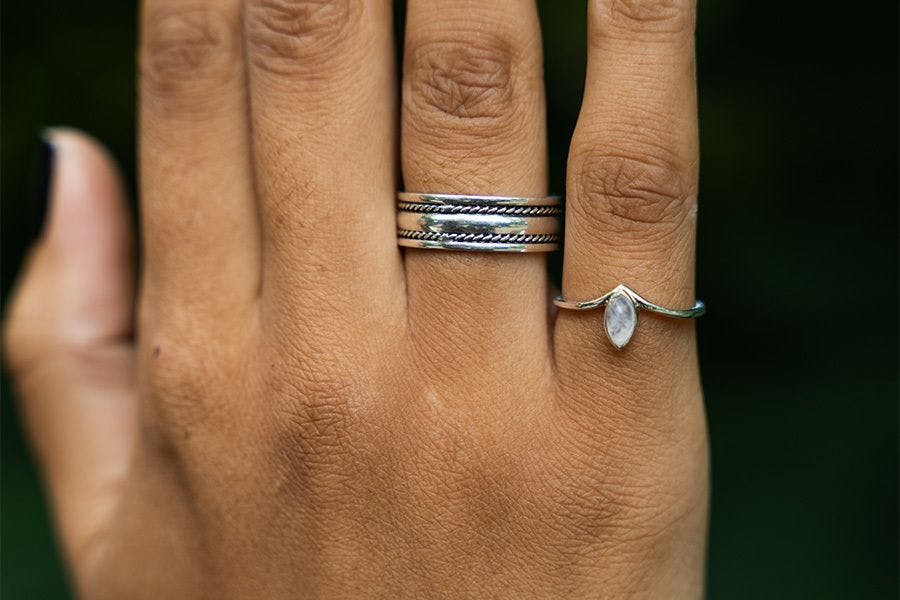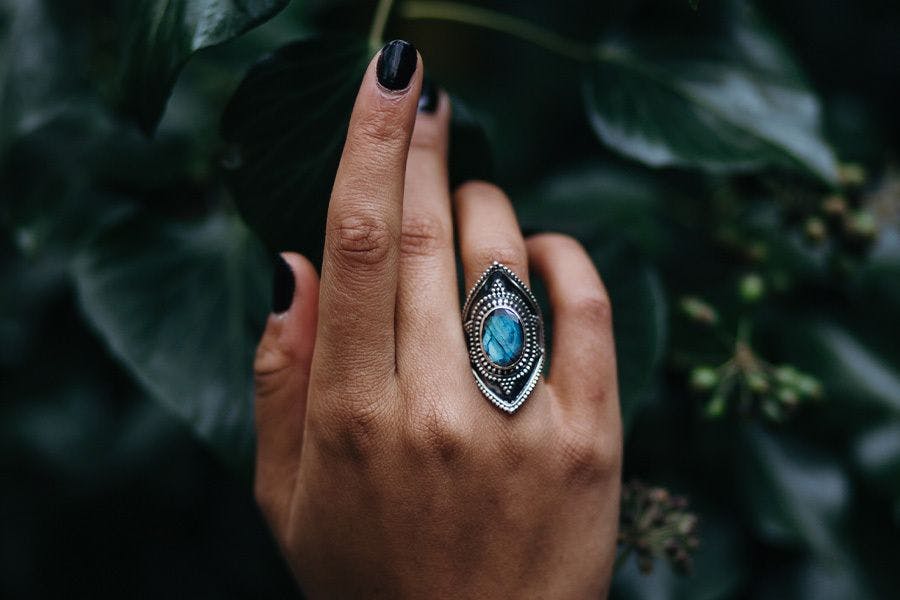From Entrepreneur to Entrepreneur - #3 Wieske Volker and Wiezewasjes
Blog
Ondernemen zonder opsmuk, in de wereld van sieraden
In From Entrepreneur to Entrepreneur #3 , Jeroen talks to Wieske Volker, the founder of jewellery brand Wiezewasjes. At Wiezewasjes, you won’t find beige beachy vibes but rather a dark aesthetic, with a strong sense of individuality. In their online shop and store in The Hague, Wieske and her team sell irresistible pieces of jewellery that stand out from the mainstream, perfectly tailored to their target audience. Wieske's approach is honest, open and bold. This boldness is evident from the inception of her business."I thought, I'll just give it a try, and if it doesn't work out, then we'll see." More than 7.5 years later, Wiezewasjes is a well-established name. But the spontaneity is still very much alive. "I still find it extraordinary to hear the enthusiasm of people who suddenly spot the store and say ’Look, there’s Wiezewasjes!’”
The name "Wiezewasjes" came about during a holiday in France, Wieske explains. It was thought up by her boyfriend. "While we were looking at the moon in the dark, he suddenly came up with it. And during that holiday, I immediately registered it with the Chamber of Commerce,” Wieske laughs. "At that time, I didn’t know what I was going to do, but I did think: if I do something, this will be the name!"

Entrepreneurship lesson #1. If it excites you, take the gamble!
The fact that it became a jewellery store was by no means certain. Wieske: "I always had jobs in hospitality, in a clothing store, things like that. So, I was good with people and good at selling. But I also have an anxiety disorder, and it just didn't work out so well. Not for me, but not for a boss either. I had been talking to my boyfriend for a while about doing something else, but I didn't really know what. However, during my jobs, I often had ideas about how things could be done better. To explore her options, Wieske visited a trade show a few months after her holiday in France. "That’s where it all came together. I saw jewellery and thought that's small, I can easily do that from my student room. I like jewellery, gemstones and that sort of thing, and I also wanted to sell something sustainable. So, real silver, for example, and in the beginning, I also sold organic tea and other items." This is how Wiezewasjes started as an online shop with a slightly broader range. "I built a website myself, in a program that was constantly crashing. It was really terrible, but it worked. And within a few months I started advertising as well. I invested every cent I could spare, with the idea that I could always go back to working in a store. But within a few months, I was already able to hire staff."
Entrepreneurship is certainly in Wieske's blood, she says. From her father, who had a business in metalworking machinery, she learned all the ins and outs of the business. Moreover, it reinforced the idea that she should do something with it. "I'm very much an 'all or nothing' kind of person, so if I commit to something, it's a gamble, but I go all in. I am starting a business, and I really want to get it right the first time."

Entrepreneurship lesson #2. Being able to see your vulnerable side is of value to your business
"That Wiezewasjes took off immediately also had to do with the momentum at the time" says Wieske. "Ads on social media were just starting to gain traction back then. You could put in, say, ten euros, and just see what it did. Now, everyone does that, and it's much harder to stand out. Plus, it was the era when Internet shopping was also taking off, so I think we just did the right thing at the right time. Yes, I worked really hard, but I also had some luck with that." Jeroen responds: "How modest." Wieske smiles apologetically. "Yeah, I don't really know how else to put it." She explains that she mostly relies on intuition when it comes to entrepreneurship but with a pragmatic approach: "I always try to figure out where that feeling is coming from!"
"I once had an HR lady who helped me with all kinds of things, and she said: ‘if it doesn't feel right, trust that feeling, because you’re so attuned to it’. And I am. When I have doubts about something, I already know I shouldn't do it. And if I'm not doubting, I'm also sure it's right." She corrects herself: "But once, I also didn't want a piece of jewellery to be photographed with a pink flower. Then, when it was, that piece of jewellery became the best-selling item. So sometimes you just have to let it go."
The nuance is characteristic of Wieske. "It's just kind of who I am." she laughs. "People think entrepreneurship is a straight line. I often think ‘entrepreneur?’ I just have a little store that accidentally became quite big, and that's very nice. However, it is the case that others might perceive it as 'it's as though you're approaching it all with a lot of uncertainty and as if you don't know it very well.’” Jeroen agrees: "I think it actually allows you to grow, because you constantly question everything. If you didn’t, you’d be just focused on showing how great everything is going.'"
Wieske adds:"Yes, I think it's very important to show my insecurity, because it's not all super easy. Things like HR matters, finances, having confrontational conversations... At the same time, it makes people think 'if someone like that can do it, I can do it too', but you have to realise that doing business is often a hassle as well. So, I try to be open about everything, the good and the bad. And yes, I am also someone who doubts, but when I do make a choice, or someone or something is the deciding factor, it’s always a very conscious decision."

Entrepreneurship lesson #3. Be honest, even about what you don't know
One of those choices is the new webshop, built in full collaboration by Harborn. In the shop you’ll find dark colours, unique illustrations and: extensive accountability. For instance, the website for the Spring Cleaning sale includes an explanation of what Wiezewasjes learned from bulk buying during the pandemic and how they plan to do things differently in the future. They are also open about the switch from gold-plated with 14-karat gold. This is supported by a quote from Maya Angelou: "Do the best you can until you know better. Then when you know better, do better”. Wieske: "I really want to operate sustainably. That's why, for example, we no longer sell gold- plated items, only 14-carat gold. We have our own goldsmith in the Netherlands and work extensively with recycled gold and silver.
We know who sets the stones in our jewellery, but the truth is that we often cannot know whether these stones are 100% free from child labour. That's definitely a concern for us, so we also disclose this. We investigate the origins, but we can't personally inspect the mines. And in other product categories, other items that people buy, there are many products where you can't completely rule it out. Then you can choose not to sell stones, but we don't want to do that. However, we do a lot, and are constantly working on it. I find it difficult to keep emphasising that, because it can start to feel like greenwashing. And we certainly don't want that. So we tell our customers: 'We’re not 100% sustainable, but we do our best’. Then it's up to you whether you want to buy from us, a company trying its best, or a company that doesn't do anything at all... Or from someone who does it 100%, but also has the means to do so and sells very expensive jewellery as a result. We give people the choice and respect the choice they make. Meanwhile, we’re also working on how we can learn more about it. That simply takes a lot of time and money, and in the meantime, all the projects at Wiezewasjes continue as well.”
The webshop is another example of “Do the best you can until you know better”. Wieske built the first website herself ("in one of those programs"), but after years of stress during peak times, she finally had the necessary funds for a new webshop. "Together with the store in The Hague, a classic case of Clicks & Bricks" Jeroen laughs. Wieske: “We started that store a year after we opened the online shop. And that was pretty much out of the blue. I saw a building for rent, and I knew there were people asking if they could see our products in person. So, I thought, well, alright, let’s open a shop. We could get a good lease contract, and we could also get out of it if things didn't work out. That’s when I really noticed that people from online were coming to our store to see our products in person. We also have a lot of customers stopping by the store who aren’t familiar with our website, so it really works both ways. They complement each other." "And do you have a preference?"asks Jeroen. "I'm not sure. With a physical store there’s more to manage. If someone is sick, for example, or if something happens. Online offers a bit more peace and quiet. But online you have less of those enjoyable conversations. Not that those conversations don’t happen, but they’re more likely to be messages through customer service to report that something has gone wrong."
"I'm really very happy that during the rush of the pandemic we had a good website that could handle everything. We've stopped doing Black Friday now, but for the first few years, we ran it with the old site. I used to be on the phone at three o’clock in the morning because everything was crashing. The provider always helped, but at that time I did wonder: how do large companies manage this? And because I didn't know much about it, I also thought: Okay, we can indeed switch to another party, but will it really be better or is it just expensive and the same hassle? That’s when people showed me that it really could be different and better, and I started to explore what was financially feasible. With the videos and articles I received, I also got a bit more insight into what was possible, and it was quite enjoyable, from a creative perspective, to be involved in all that. Suddenly, you have to think about how a button should look. Should it be square, or should it be rounded? Should it be transparent or not? What should the colour be? So many questions, about one little button. That was a part of the process where Harborn was incredibly helpful. I do want to change the colour of the buttons soon, but other than that, I'm still super happy with what they built!"
Entrepreneurship lesson #4. Gather the right people around you
"A good collaboration is truly the most important thing for to me." says Wieske. This is reflected in the way she leads her team: based on instinct, but also by giving them complete freedom. Wieske adds: "I genuinely have lovely people around me, that's just how it is, ha-ha." Then, on a more serious note: "I also choose my team based on instinct. And I’ve discovered that I really like to throw people in at the deep end. That may sound unkind, but what I mean is that I always select people who fit the team, not necessarily those who are the best for the job. Because I value a nice working atmosphere more than everyone doing things on their own little island. I’ve found that you achieve more that way. As for throwing them in at the deep end: of course we explain what needs to be done, but I still want you to make your own mistakes, because that's how you really learn the most. If I see someone going in completely the wrong direction, I'll intervene in time, but I want you to try it on your own first.”
We once had an intern who sent out a newsletter with all sorts of mistakes in it. Well, that goes out to tens of thousands of people. Some people might say: 'Wouldn’t that keep you up at night?’
But I don’t feel that way, because I know it doesn't actually matter much. She will see that herself once it’s been sent. And I know that people would rather press the buy button than read the whole email. It’s about learning from your own mistakes: now that person will never ever forget to check a text before she sends it. So, that's the way I like to do it. I want to lead, but more in the sense of 'helping where needed' than really being on top of things and double-checking everything three times. I prefer to focus on the processes. Making sure they improve, making the work easier for everyone. But 'try it yourself first' is kind of my thing. And for that, you have to be able to trust your team. "I'm truly fortunate that, when I need it, I can simply not be there for a while, or just be there remotely. It feels incredibly comforting. And when I'm back again, it's very nice, and everyone is happy. I really appreciate that this atmosphere exists within the company, and I believe customers can sense that too.”

Entrepreneurship lesson #5. Sell a story
The atmosphere isn’t just one of connection and cosiness, but also of uniqueness and choosing what suits you. A coherent story that fits Wiezewasjes and is also reflected in the online store. For example, customers can filter by their star sign, and see jewellery with stones that correspond to their sign. Jeroen asks: "So is it the same with you, that you have certain zodiac signs in your team?" Wieske laughs. "Well, not necessarily, although we have somehow had a number of Virgos as office manager. They’re very organised, and that stands out. But it's not like we actively look for someone who is a Virgo if we have a job opening... Although, It's actually a question in the job interview! But more to break the ice, ha-ha." She continues: "With stones and star signs, it’s mainly because I enjoy looking at them and figuring things out. And so does everyone else. It works really well, because even if you don't believe in it, it’s just something that's fun to talk about. Or to know. At Wiezewasjes we’re also selling a story, of course. And this is something that sets us apart. The same goes for our stones, for example. I personally find that super interesting: some things have been around for a hundred thousand years, and that ends up in a ring! Many companies are focused on sales, but I believe that providing information is essential. I like to sell the story along with the product." Wieske thinks for a moment. "There is of course often a story attached to jewellery anyway, and I really like it when things like that come up. For example, quite often we have people buying engagement rings. Or someone who comes into the store and tells us that she is now married and expecting. And that Wiezewasjes is part of their story, that remains something very special."
So basically, Wieske is doing exactly what she wants, and bringing along the people who share the same outlook. Whether it's her team, the people she works with, or customers: they all share a passion for beautiful things and for Wiezewasjes, in all its various facets. Wieske's golden tip is that if you really like it and think you should do it, go for it. Just do your thing and see where it takes you. You might lose some money, or time, but how bad can that be if things go wrong in the beginning? And after a few years, you'll have a better understanding of potential pitfalls. Of course, it's not always your own choice to go bankrupt, but after a while, you can get a better grasp of it all. Doing is really the most important thing. Entrepreneurship? You just have to start, otherwise you will never know."
Jeroen
Would you like more information?
Would you like to read more interesting stories? See our insights
Jeroen would like to tell you more: